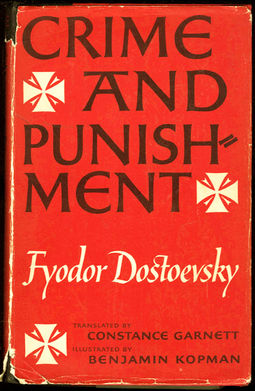At first--even long before--he had been occupied with one question: why almost all crimes are so easily detected and solved, and why almost all criminals leave such an obviously marked trail. He came gradually to various and curious conclusions, the chief reason lying, in his opinion, not so much in the material impossibility of concealing the crime as in the criminal himself; the criminal himself, almost any criminal, experiences in the moment of the crime a sort of failure of will and reason, which, on the contrary, are replaced by a phenomenal, childish thoughtlessness, just at the moment when reason and prudence are most necessary. According to his conviction, it turned out that this darkening of reason and failure of will take hold of a man like a disease, develop gradually, and reach their height shortly before the crime is committed; they continue unabated during the moment of the crime itself and for some time after it, depending on the individual; then they pass in the same way as any disease passes.
One thing that surprised me about Crime and Punishment, which I have now read for the first time, is how early the Crime part happens. Raskolnikov's murder of the pawnbroker Alyona Ivanovna and her sister Lizaveta happens very early in the novel. In the first few pages, it's presented as a kind of obsession for Raskolnikov, a foregone conclusion he is steeling himself to make, and only later do we discover his rationalization for the horrible act: by killing the pawnbroker, he believes he can "step over" the bounds of civil society like Napoleon or other great men, who were able to do great things because they did not allow themselves to be straightjacketed by laws and norms. But Raskolnikov is not Napoleon, and he is tortured by his act and its implications. Yet this torment forms a kind of background for much of the novel, which is taken up by a set of other, intersecting plotlines: the death of the drunk Marmeladov, Raskolnikov's love for Marmeladov's prostitute daughter Sonya, the proposed marriage between Raskolnikov's sister and the wealthy Luzhin, and of course, the machinations of the vile Svidrigailov.
Approaching a book like this for the first time is tough, especially when you don't have any special expertise about Russian literature. I have a vague sense that anything I might say has already been said, and developed far better than I'll be able to articulate. But let me make some tentative observations. The first thing I see in Crime and Punishment is a veiled statement on class. Raskolnikov's assumption that great men can get away with murder is essentially correct, but his belief that all it takes is a will to power fails because it lacks class awareness. (I had a dim understanding that Raskolnikov's attempt to "step over" the law is connected to Nietzsche's Ubermensch, but I guess this book was written first, so maybe the influence works the other way? I'll have to look this up.)
Raskolnikov, after all, is not the only criminal in the book. There are two others: Luzhin and Svidrigailov, both of whom want to use their wealth to control Raskolnikov's sister Dunya. (Luzhin wants to marry her; Svidrigailov's desires are more crude.) Luzhin is a clown and a fool who thinks throwing his money around makes him admirable--a type of guy who has not disappeared in a century and a half, you must admit--and who stuffs a thousand rouble-note in Sonya's pocket just so he can accuse her of stealing, thus discrediting her, and by extension, Raskolnikov. If anyone in the novel seems like they could "step over," it's Svidrigailov, whose disinterest in virtue or ethics is nearly sociopathic. And yet in the end, even Svidrigailov isn't Napoleon; which is to say that he hasn't the resources to legitimize his evil. Combine Svidrigailov's viciousness with Luzhin's money and you might start to approach a Napoleon. But how could someone like Raskolnikov, a big sensitive baby without a dime, ever hope to do it?
I think Crime and Punishment has much to tell us still about how to understand human capacities for good and evil. It made me understand how totalizing our cultural conversations about these things can be: "Should X be canceled for doing Y when they've also done Z?" Applying such frameworks to Crime and Punishment seem silly: "Should we cancel Raskolnikov for killing the pawnbroker when he gives his remaining twenty-five roubles to Sonya's family after the death of Marmeladov?" Plotting good and bad deeds, as if on a number line, fails to help us understand anything about Raskolnikov. The end of Crime and Punishment, in which--spoiler alert--Raskolnikov confesses and submits to the suffering of the gulag, suggests that suffering can be ennobling and renewing, and that such suffering is inextricable from the crime that necessitates it. Great criminals, Dostoevsky suggests, are capable of great things because it is they who have the greatest capacity for suffering, and thus the greatest capacity for change. For a book whose religious ethic is buried fairly deep--save perhaps for the moment where Sonya gives Raskolnikov her cross, and exchanges it for the murdered Lizaveta's, a moment layered with symbolic meaning--its attitude toward sin and redemption seems deeply Christian.


No comments:
Post a Comment